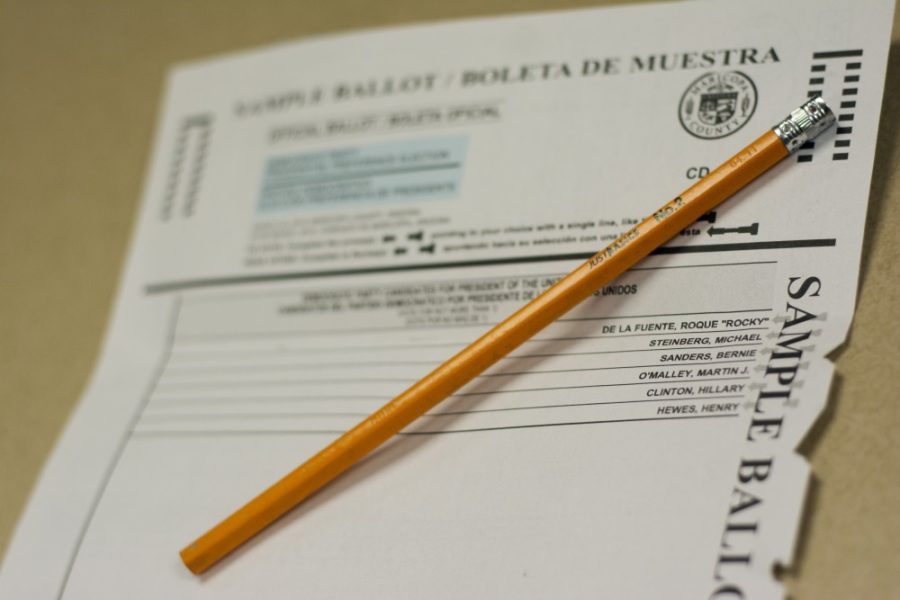All eyes were on Arizona on Tuesday, watching how the state would vote in the primary preference election that was nationally dubbed as one of the more important votes in the primary election cycle.
All eyes were still on the Grand Canyon state Wednesday night, but this time, they were focused on it for another reason.
After a voting day marred by four-hour lines at the polls, confusion on voter eligibility and a myriad of other issues, national headlines shamed the process and spoke of uncounted votes. State officials called for investigations and the resignations of those in charge of organizing Arizona’s primary preference election.
“The issues that arose with the amount of time voters had to stand in line, confusion surrounding eligibility and other issues are completely unacceptable,” said Arizona Secretary of State Michele Reagan in a statement. “My office will launch a full-scale statewide review of county election policies and procedures surrounding [Tuesday’s] election.”
Controversy primarily centered on the amount of voting stations actually open and voters who were registered incorrectly in the polling stations databases being turned away.
Maricopa County, which had projected to see a record voter turnout on Tuesday, slashed the amount of polling stations open.
Only 60 polling stations were available to voters in what is Arizona’s most populous county. Pima County, in comparison, with the second-largest population in Arizona, had 130 polling stations open.
To add to the mess that became of election day, the Pima County Recorder’s Office was evacuated Tuesday afternoon after a bomb threat in the adjacent parking garage. The evacuation left hotlines for voter help left unmanned for the hours leading up to the closing of the polls.
Krista Hansen, a public health graduate student, was turned away at the polls on Tuesday. She was told by a volunteer she was registered as a libertarian and therefore ineligible to cast a vote.
Hansen said that she has never been anything but a registered Democrat since she first registered as a voter.
“I don’t know what could have possibly happened,” she said. “But I’m so sure that I’ve always been a Democrat, and that I was very clear that I wanted to register as a Democrat.”
Hansen wasn’t the only one turned away from that polling station. There were separate lines full of people with the exact same problem, according to her. She even saw her neighbor in the crowd. Like Hansen, he was a life-long registered Democrat who suddenly was registered as a Libertarian.
Hansen said she left the polling station feeling like she had done something wrong, that it was her who made the mistake and actually registered incorrectly.
“I know I registered as a Democrat,” Hansen said. “But of course, you feel like they’re telling you the truth, so of course you felt like there was some sort of fault on your part.”
Shayna Stevens, executive director of the Associated Students of Arizona, said this feeling of having done something wrong is an issue that was widely spread among younger and first-time voters.
Among the hundreds of requests for assistance and calls from students at the polls, Stevens said a large chunk of them were from people who thought they may have messed up the registration process.
This perception — at least for the majority of people calling the ASA on Tuesday — was untrue, according to Stevens. She knows this because in the weeks leading up to the election, the ASA had been assisting students who are registered largely as independents register with a party whose candidate best represented their views prior to the Feb. 22 cut-off date.
“Everyone is feeling like their vote didn’t matter,” Stevens said. “And at this point, it didn’t.”
Stevens said one underlying issue is that a majority of students going to the polls were also first-time voters, so when they were told they were incapable of voting, they didn’t have the prior experience to challenge being turned away.
The ASA will be going to the capitol next Monday to participate in hearings on the hiccups of Tuesday’s primary and to ensure that the student voice in Arizona is taken into account by the legislature. The organization also wants to fight for the provisional ballots submitted that day that are currently in jeopardy of being counted.
“It’s a matter of ensuring that students know their rights when voting,” Stevens said. “As well as how to defend those rights.”
Follow Sam Gross on Twitter.









